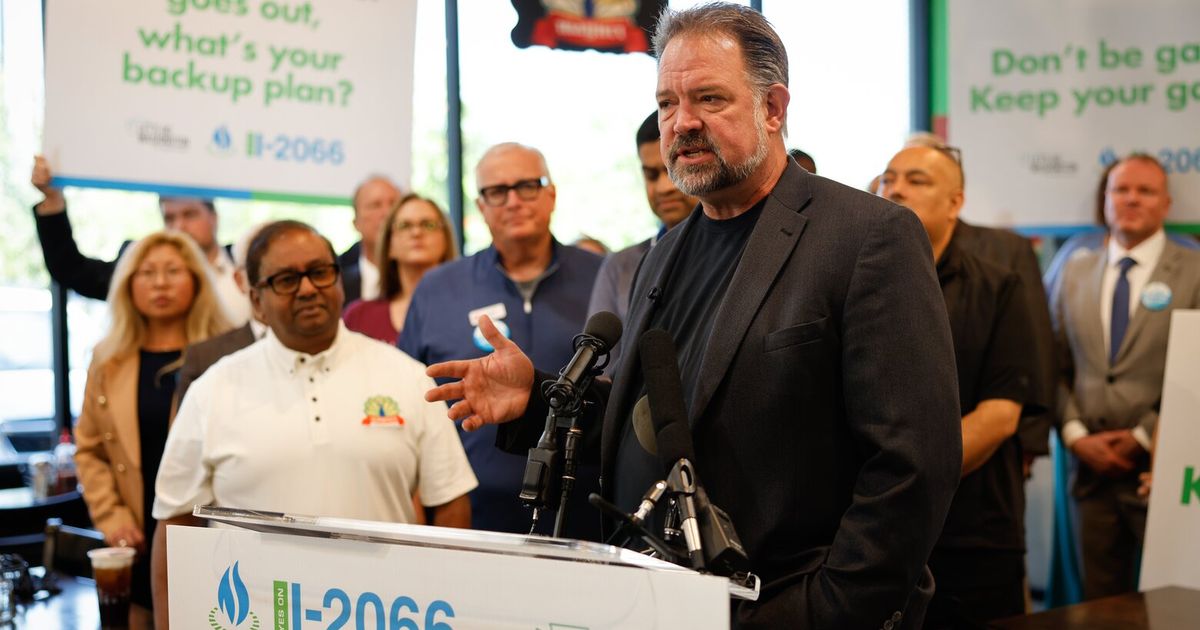TUMWATER — Supporters of a measure that would require continued natural gas service in Washington say they have enough signatures to get on the ballot in November.
Initiative 2066, if passed, would explicitly protect natural gas use and repeal certain portions of a law passed last session that aimed to help the state’s largest utility, Puget Sound Energy, chart a course with the Washington Utilities and Transportation Commission to eventually transition away from natural gas service.
If the petition is successful, that would set up a big ballot battle this fall in Washington over environmental issues. The natural gas measure would join Initiative 2117, which would repeal the state’s system to limit and reduce carbon emissions.
At the Secretary of State’s office in Tumwater Tuesday afternoon, supporters turned in about 431,000 signatures, which were collected from voters in less than two months before a July 5 deadline. Supporters plan to submit another batch of signatures later this week.
The petition needs about 324,500 valid signatures to qualify for the ballot. The signatures must be verified by the Secretary of State’s office.
Let’s Go Washington, the group bankrolled by Redmond businessman Brian Heywood that’s backing a slate of initiatives this year, including the quest to repeal the carbon market, threw their weight behind the gas measure and supported a statewide signature gathering campaign.
Heywood said the initiative is a collaboration between Let’s Go Washington, the Washington Hospitality Association and the Building Industry Association of Washington, which funded the initiative’s signature gathering operation.
Both organizations echoed concerns from restaurant owners, grocery store and hotel operators and builders that natural gas, which is mostly methane, is essential to their operations and keeping prices affordable for consumers.
“We’ve formed a partnership that is the model of how the citizens push back when the Legislature overreaches,” Heywood said.
Standing with supporters in front of pastry cases and mango juice, Dan Deva, a partner of Mayuri Foods, a South Asian grocery store in Redmond, said his stores rely on natural gas to power equipment in the kitchen, refrigerators and the grocery’s healing and cooling system. Converting to all electric would cost something in the range of $700,000 to $800,000, he said.
“(Initiative) 2066 is very simple,” said Greg Lane, executive vice president of the Building Industry Association of Washington. “It protects natural gas service to every home and business that currently has service of natural gas and secondly, it protects the freedom of every Washingtonian to choose what energy source they want to use for their home and business.”
During this year’s legislative session, lawmakers passed House Bill 1589, which aims to help Puget Sound Energy work with the Washington Utilities and Transportation Commission to comply with earlier climate legislation, including the state’s plan to limit and reduce carbon emissions and decarbonize its electricity supply.
Although the law does not outright ban natural gas, the initiative supporters say they want to protect the consumer’s choice to use natural gas as the Legislature pushes utilities and ratepayers to electrify. Natural gas, the initiative supporters say, is cheap and reliable and the current electricity grid is not prepared for increased use.
Lane pointed to the higher cost of an all-electric system when building a new house, for instance. Electric appliances are more expensive, and the cost of building the electrical infrastructure is also more costly than running a gas line into the house, he said.
If passed, the initiative would repeal provisions of the law, including assessing the potential for electrification within geographic areas and achieving cost-effective electrification for natural gas customers.
House Bill 1589 included a provision that would have allowed the utility to potentially merge its natural gas and electric customers into one rate plan, though PSE has said that change is not required and doing so would take “more than several years.” The initiative includes language to repeal that provision, Lane said.
The initiative would also take aim at recently passed energy efficiency mandates he said were intended to make it nearly impossible to install fossil-fueled appliances in new buildings.
State Sen. Joe Nguyen, D-White Center, who helped champion House Bill 1589, said the initiative would doom low-income and industrial methane gas users to even higher rates as wealthier ratepayers are transitioning toward electrifying their homes and buildings. The bill gives one utility in the state the ability to “thoughtfully” begin planning around that trend, he said.
“Even if folks have concerns about the ability to use methane gas in the future, which there is no prohibition from and the costs associated with it, this (initiative), fundamentally, is poorly written,” he said, adding the initiative seems to conflate changes from Washington’s building code council with the PSE bill.
Nguyen also emphasized that even in the most aggressive electrification plans, which the law ultimately did not allow for, natural gas would have never been turned off overnight for customers and would include a multiyear planning process with the utility commission.
Climate Solutions, which testified in favor of the PSE bill, also said in a statement that the initiative would be a “major misstep in our path toward a clean energy future” and the existing laws are essential to keep utility bills “as low as possible.”
Caitlin Krenn, climate and clean energy director at Washington Conservation Action, said the initiative was “the latest in a slew of misleading and destructive” initiatives backed by Heywood.
“I-2066 would take away communities’ choice, jeopardize rebate programs that help families and small business owners afford building upgrades, repeal commonsense measures that make homes and workplaces more energy efficient and healthy, and erode clean air protections,” Krenn said. “Over time this measure will raise energy costs for hardworking Washingtonians.”








:max_bytes(150000):strip_icc()/roundup-writereditor-loved-deals-tout-f5de51f85de145b2b1eb99cdb7b6cb84.jpg)


